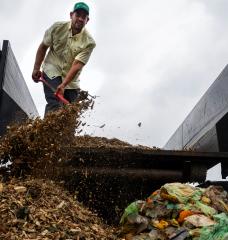
This short but poignant article from Devdiscource News Desk illustrates a region's real-time struggle with considering climate action. The New Zealand regional council wants more evidence on human-caused climate change, but they also want to understand its possible impacts and how action will affect the community, on both a social and economic level. Learning from the cultural divide that climate action has caused in the U.S. and France, they want to make the right choice for all residents in their region.
I'm curious to hear your suggestions on how small-scale, rural communities -- with limited funding and resources -- can go about reducing emissions and preparing for climate change. What options are available to a region like this one in New Zealand? Resilience Dialogues offers support for U.S. communities, but what about abroad?
West Coast council rejects government's Zero Carbon Bill
The council's planning, science and innovation manager Hadley Mills said there was too much uncertainty about the economic and social impact from the bill.
Devdiscourse News Desk New Zealand
Updated: 29-01-2019 01:50 IST Created: 29-01-2019 01:50 IST

Image Credit: Pexels
The West Coast Regional Council wants more scientific evidence to prove human-driven climate change is happening before it will commit to reducing emissions.
The council does not support the government's Zero Carbon Bill and is the only regional council in the country to reject it.
In its submission, the council said if West Coasters were to commit to emissions targets, "the evidence proving anthropogenic climate change must be presented and proven beyond reasonable doubt".
The council's planning, science and innovation manager Hadley Mills said there was too much uncertainty about the economic and social impact from the bill.
He said a lot more work needed to be done so they could understand how jobs and communities would be affected.
He said the council was not denying climate change but it was a struggle to understand it.
"We must be objective and base our decisions on science and that's why we want the science presented really simple; we don't have climate change experts on our staff so we just want everyone to understand it."
The council's stance did not impress Hector local Penny Madden, who said in her 20 years in the region the sea changed dramatically.
"I mean it's lapping right at my sea wall at high tide now and that's really close."
Ms Madden had no doubt this was the result of climate change and said the council's stance was irresponsible and disappointing, but not surprising.Ms Madden said the council's submission did not represent their views.
The submission went through a council meeting and was signed off by regional councils.
RNZ attempted to contact all seven representatives. One councillor, Stuart Challenger, said he was the sole elected voice opposing the council's submission and that the council needed to start acting on climate change.
Councillor and miner Allan Birchfield said the bill and climate change was a fraud and said it would end up costing locals.
He said the government needed to pay attention to what had happened in France with the so-called yellow jackets, the protesters who wreaked havoc in Paris, demonstrations sparked by rising fuel prices.
New Zealand's representative on the recent Intergovernmental Panel on Climate Change, Bronwyn Hayward, said the community should not be written off as "rednecks" who did not understand the issue.
The council submitted that it had limited ability to contribute to reducing carbon levels through tree planting as only 16 per cent of its land was not part of the conservation estate.
It also said it would be challenging for the region to move to fully electric vehicles, because of the need to charge batteries.
Dr Hayward said if New Zealand wanted to avoid a yellow jacket situation then it needed to understand what was hurting smaller communities.
"It's thinking about how these communities can be really supported in innovative ways, rather than just writing it off as a kind of redneck response.
"It's really important that we think carefully about this because we don't want to end up like America or France with these complete cultural divisions between communities."
Dr Hayward said the West Coast should be a flag on how New Zealand made the transition to a lower carbon economy.
The Zero Carbon Bill should be up before the government's Select Committee next month.
Read the full article: http://www.devdiscourse.com/article/science-environment/349995-west-coast-council-rejects-governments-zero-carbon-bill






